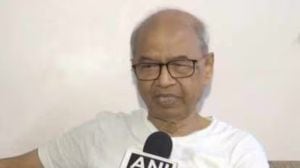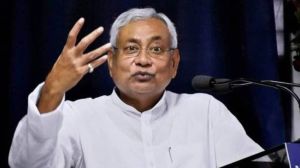‘It makes no sense… If you (the Centre) can allow it (an anti-terror law) in Maharashtra, why not in Rajasthan?’
In December 2003, Vasundhara Raje became the first woman chief minister of Rajasthan. Now in an election year, she faces perhaps her biggest challenge as administrator and political leader. The May 13 serial blasts that ripped through crowded places in Jaipur have not just announced the advent of terror in Rajasthan. In an interview with The Indian Express Editor-in-Chief Shekhar Gupta on NDTV 24x7’s Walk the Talk, Raje talks about how her government is coping with the fallout of Terror Tuesday, and what needs to be urgently done to frame an all-India response to a common threat

•With me today, just 72 hours after the serial blasts that shook Jaipur and took so many lives, is a very grim but confident Chief Minister Vasundhara Raje. Welcome to Walk the Talk, and I’m so grateful to you for finding the time… we know it’s your first interview after the blasts and you are still catching your breath.
But I think it was also important that I talked to you about it. We need to instil that kind of confidence in the people of our state.
•Seventy-two hours later and wiser, how do you look back on this period?
First of all, ours is a very peace-loving state. So for something like this to happen — in Rajasthan — is a huge shock, not just to me, but I think to the ordinary citizen also. I would say here that we have responded magnificently to this, whether it’s the government, the people, the professionals — everybody has risen to the occasion. Nine blasts, one after the other, we actually saw this happen on Tuesday, May 13. I’m happy to say that the response has been terrific. I was in Jodhpur when I heard about it. I was back on the air force flight by 11:30 in the night. By the time I got to the hospital it was about 12 o’clock. Within 15 minutes of this happening, the people had been brought into hospital; the medical teams had swung into action. By 2 o’clock in the morning, all serious operations — almost 24 of them — had been performed. And the situation was almost under control.
•And I believe the hospitals had more blood than they needed. Because people just queued up.
Well, there was a lot of talk. People said that blood was not available — which is completely untrue. People queued up. And let me tell you, there were young people, there were old people, and there were people of all communities.
•And I believe the victims were just brought in by bystanders.
I will say here that the bystanders certainly rose to the occasion. But the administration and the police were certainly not (lagging) behind. Between them they had these people in hospital within 15 or 20 minutes.
•There is the rise of this new civic spirit in India, people don’t run away.
Amazing! Amazing, the spirit that I was able to see. It was quite extraordinary.
•Two things, Vasu. One, people rise to the occasion and help. You’ve seen that now in calamities, rail accidents, that local people now rally around and help. And the second, the basic instinct of India’s populated areas in the past — of rioting, bandh, protest, targeting somebody on suspicion — not a whimper of that in your state.
Look, we took a great deal of care over this. Apart from the medical part of it, the next morning cremations took place. Public representatives, elected representatives, they were all present at the anteshtis. And the amount of compensation was given by the ministers within hours of that, in a special visit to each of the victims’ homes. So at each home that lost somebody, there were people there to hold their hands. Apart from that, we imposed curfew at 9 o’ clock in the morning.
•And I believe you made sure that there were no signs or blotches of blood.
I saw to it that before seven o’ clock in the morning, before people hit the streets, the blood was washed away, everything was cleared away, after the forensic people had taken whatever they had to take. Everything was cleared so that it looked normal and there was no angst in the people that would come out.
•But there was a call for a bandh — from people sort of related to your party, the Vishwa Hindu Parishad. But it’s obvious that your party distanced itself from it.
We made it very clear that there was going to be a curfew. We called for it, in fact, across the state. And there was a holiday and state mourning for the people who passed away. We saw to it that families got taken care of. There were ministers sitting round the clock in the hospitals. Each hospital had rosters of ministers, so that if there was anyone who had a problem, they could…
•You know the percentage of Muslims in your state is about the same as in Gujarat, which is in your neighbourhood. Many would have thought that maybe a repeat would happen — that the majority would turn against the minority to take revenge or to teach them a lesson.
Shekhar, I have to say that every city has its own character, and responds in its own special way. There is no saying that because Gujarat responded in a particular fashion or Maharashtra responded in a particular fashion that Rajasthan would also respond in that fashion. People would have taken care, and we took care, that no opportunity would arise where something like this could happen. So we did take care for that. And the people also rose to the occasion.
•And you would say Muslims should rest assured that they will be safe, there will be no reprisals.
Looking to the safety and security of my people — of castes, of creeds, of religions — is the responsibility of this government and also of its people. And we will rise to that occasion.
•Tell me, how was the news broken to you. Where were you and what happened?
I happened to be in Jodhpur at the time and was at some meeting. I came back from that meeting and they told me that there had been one blast. And then in quick succession, in half an hour, there were eight more blasts. I could not have sat there. Luckily, there was an air force station and I was able to requisition an air force helicopter and bring a medical team from Jodhpur and come here. Because at that time they required more doctors.
•Sitting in Rajasthan you are not mentally prepared for it. In Bombay, in Delhi, we are prepared for it. In Rajasthan you are not, because you have never seen terrorism here.
No, we were not prepared for it, but we were very quick with the response.
•Yes. Were there any warnings of any kind — formally, informally?
No, there weren’t any warnings and I must actually thank the national security adviser, and B. Raman (former R&AW official), who have written some brilliant articles about it, making it clear that we were not prepared for this kind of pan-Indian terrorism. It’s not happening just in my state.
•But there is some suggestion that there was a warning from the home ministry some time back?
Well, in M.K. Narayanan’s article it has been made very clear that we were not prepared for it, and neither did anyone have any particular information that something like this would happen. I am grateful that it has come out in the papers.
•You’ve compared some of these warnings to weather reports.
Yes.
•So give me an idea of the kind of warnings you get, the kind of weather reports.
You get a kind of advisory on August 15 and January 26 telling you that you should be careful that such activities could happen, and these go to every state.
•But nobody told you that Jaipur is now a target?
No. Nobody has told us particularly that it’s a target, and Narayanan has said that very clearly in his article that we had no particular information.
•But what kind of response have you had from the Centre since this happened?
We’ve had a conversation with the prime minister, a conversation with the home minister. I’ve noted Sriprakash Jaiswal’s (minister of state for home) article in the papers, and in the press conference, where he said that he had warned us, which I’m afraid is not true. And the visit of Sonia Gandhi.
•Initially he said he doesn’t even know what’s happened, he’s only seen it in the media.
And after that he went on to say that he’s mentioned it to us. And now the NSA has made it very clear that we had no information about this. So I think the time has come for us to realise that we cannot have knee-jerk reactions to things like this. Since it is pan-Indian, it’s absolutely imperative that the PM call an emergency meeting of the internal security of the states, discuss with the chief ministers what the road map should be. So that we work together.
•Many of the NDA chief ministers have been demanding this. Do you see any reason why the PM has not done it so far?
I think that it is the logical step to take, because after you repeal laws like POTA, you don’t really have anything strong in your hands to deal with this. You see the kind of flip-flop you do over people like Afzal Guru. There is no strong action, wherein you strike terror into the heart of the terrorist. Obviously, there’s some similarity between what we’ve seen in Jaipur, Uttar Pradesh and Malegaon. They all have something in common. And Ajmer and Hyderabad have something in common. So obviously it’s not a one-off thing that’s happening here, it’s something that’s happening across the country, and for that we need to sit down and plan. This is actually a war.
•What you faced here is a serious terrorist attack, it’s not some amateurs using crude devices, local explosives.
It’s a sophisticated terrorist attack by some, I would imagine, international gang, that is operating across our country and the device itself was so sophisticated. And they have access to every sophisticated manner of communication. They’re on the web, they’re emailing each other, their weapons are sophisticated, their method is sophisticated. And we are archaic in our response.
•You talk of sophistication — does it involve the dreaded three-letter word, RDX?
I would say it involves it all, everything’s involved in this. The latest type of ammunition, weapons…
•And why do you say we are so archaic?
Most states, I believe, would not even have cells that are dealing with terrorism.
•Do you have them?
We are a border state, and whether the Centre involves itself with us or not, we are going for an emergency meeting, a special task force, in which I want to invite experts on terrorism. And by May 19 itself we will have our first meeting and chalk out…
•These are experts from the government or those who have left the government?
Well, they could have been in government. There are two or three states that have started to deal with terrorism with expert advice.
•Such as?
Andhra Pradesh, Maharashtra, UP — they’ve all set up their own wings, so maybe somebody from them.
•These are all states run by rival political parties.
I have no issues with this. I believe that this is an attack on the country; it’s not a question of a party.
•You were organising this meeting of . . .
Unfortunately, I’d like to say here, Shekhar, somehow there seems to be this thing that if one party begins something, then a second party has to drop it. So if the NDA came up with POTA, then you must drop it. But sometimes I’m amazed that you could drop it at the central level, where you need it most. That you could not allow Rajasthan and Gujarat — we’ve been waiting, one state for three and a half years, one state for two years — a law of this nature, but you can allow it in Maharashtra. And you could allow it in Himachal Pradesh. It makes no sense.
•UP’s going ahead now.
But the point is it makes no sense, it should come right across the country, and the states must be brought together on this issue. Then there are things such as the Girish Saxena report, which have come out, where they have recommended that you need to strengthen the intelligence network. You only have 3,000 people working on intelligence across the country. And you need to have a national database on criminals and terrorists, which we don’t have. So that information can get disseminated and sent to the states.
•This committee you are setting up on how to deal with terrorism is unconventional. Normally wouldn’t you have just gone to the home ministry and Government of India and said, look, you’ve got the IB, R&AW, CBI, etc — all the impressive acronyms of Delhi, of the security establishment — so come and help us. Are you going beyond them to seek help? And is there a reason for that?
This kind of thing has been repeated in the NDC meetings, security meetings that they have maybe once in a year. But I really believe that we can’t afford to wait any more, the response time is so slow. And we can’t afford it — our people can’t afford it. I’ll give you an example: on the deportation of the Bangladeshi nationals who are finding their way into Rajasthan, we have written letters to them many, many times. We wrote to them in June 2007 to say, look, we need to do something about this. We got a reply from them to say that, well, why don’t you just collect them and put them into a transit camp somewhere.
•You mean collect all the Bangladeshis in your state and put them into a transit camp. They formally wrote to you? Who? The home ministry?
Yes, to go ahead.
•You mean you can set up your own Guantanamo Bay?
Something like that. But it’s much more serious than that.
•But how can you quarantine so many thousands of people?
This is the question that I’m asking — it’s impossible for a state to do this without the support of the Centre. Now the problem is that if there’s a major procurement of grains to be done, the state does it. If there’s a terrorist action, then they write to you to say take some action. If there’s a rise in prices, they write to you to say there’s inflation, you must do something about it. So what is going on?
•Let me go back on this, and let me be clear. The Centre, the home ministry, has formally written to you that if you think there are illegal Bangladeshis, you can round them up?
Kindly round them up and put them in a transit camp, which you pay for. Yes.
•And you feed them there? And what happens after you have them in a transit camp?
We don’t have any idea, because we’ve been going on with this since June 2007.
•But under what law can you detain people in a transit camp? This is exactly what (US President) George W. Bush has done with his suspects around the world?
We are asking the same question. There, George Bush had done it. Here, you’re asking the states to please do it. Therefore, I keep saying I think it’s time for us to look at this in a holistic fashion.
•How many illegal Bangladeshis do you think there are in your state?
Well, it began with about 2,500. In Jaipur alone there are about 10,000, so I am told. And approximately, across the state there would be about 20,000.
•And you are not going to put them into this transit camp?
No, we’re going to have to take some action. We have tried to apprise the Centre about it.
•But if you now set up a transit camp in your desert, and put them there, you are perfectly within your authority to do so, because the Centre wrote to you to do this. Isn’t it?
Yes, you could say that. But does it relieve you of your problem?
•Because then they will be there.
Of course, they will.
•But why the focus on Bangladeshis?
Because there’s a lot of illegal activity that has taken place there.
•Are you linking them with the blasts this week?
Well, the e-mail that was sent was by HuJI. And this is an organisation that actually works out of Bangladesh. Of course, it has branches all across our country. And, as I said, similarities are there between (attacks on) two or three states. So it’s there for everyone to see. Now, the case has not been cracked so one can’t say for sure. But you can see from the e-mail that definitely there is some involvement from people outside this country.
•And there is also some Bangladeshi cigarette packet and things, but this could be a red herring for all you know.
It could be a red herring, but on the other hand it could also be…
•So beyond that how far has the investigation proceeded?
Look Shekhar, I wouldn’t want to jeopardise the investigation in any fashion. But I would say that they have progressed to some extent. There is a kind of idea of the way the people have gone about it. Some of these areas have already been raided. For example, where the cycles were bought from, the cyber café from where this e-mail has been sent, those kind of things are there. But they’re working on interesting leads, they feel that there will be some breakthroughs shortly, and therefore, I wouldn’t want to actually jeopardise it in any fashion.
•Sure, let’s stick to the larger issue of fighting terrorism. The Centre very often would say that look, law and order is a state’s responsibility, so they can’t make mistakes and then blame us.
Let me be very clear. We do not, or will not, shirk from our responsibility. But terrorism is not something that can be dealt with by a state alone. Because the terrorist moves from here, let’s say, to the neighbouring state after having committed a crime here. From 2003 to now, there have been some eight-nine major instances that have taken place. In some cases, the cases have been cracked at the local level. No one, so far, has reached the mastermind. And there are still cases that haven’t been opened. Now, as I said to you, if there are similarities between three states or four states, it’s important that there comes an agency that brings all of these together to share the information with each of the states so that the states can become more effective.
•And that’s not happening?
Not at all. B. Raman, formerly of R&AW, has brought this out so well (in his article). And also M.K. Narayanan.
•But in your communications with the Centre, have you pointed this out to them?
This has been pointed out. I have also said that it’s time for this database to be set up. It’s time for this group of chief ministers to meet. It’s probably the simplest thing that one would do.
•And if the Centre does not call this meeting of chief ministers, what will you do?
I think that perhaps like-minded states will have to get together and think about what to do, for the security of their people, because we cannot afford to sit back.
•Because that would then mean some kind of a breakdown in Centre-state relations, on an issue as important as terrorism.
I don’t think we should get as far as that. I think we would probably be jumping the gun. But I think it’s important for both of us…
•Do you find that some of the states and the Centre are not in tune with each other — you’re out of sync?
There must be some problem somewhere. If a law can apply to one state and not be allowed to apply to another state, there must be …
•You’re talking about the anti-terrorist law? What’s it called? RCOCA?
Yes, it’s the same law as the one allowed in Maharashtra. If you can allow it in Maharashtra, why not in Rajasthan? These kind of issues, they do tickle your mind.
•Well, in Gujarat, they would say that Narendra Modi would misuse it against Muslims. Maybe they’ll use the same argument against you because you’re a BJP government.
I don’t think it’s a good idea to look at it as a BJP government and as a political entity. I think it’s time for us to bury those things and look at the interest of the nation. And if more and more states come under the attack of terrorists, then really the whole nation shakes.
•So when you take this up, have you taken it up with the PM? Why have you stopped my law, when Maharashtra . . .
Again and again.
•What does he say?
Deathly silence.
•He doesn’t explain to you?
There’s deathly silence from the home ministry and we’re waiting. But under the circumstances of what’s happened recently, perhaps there will be a rethink.
•From the PM also you get silence? You don’t get an explanation?
So far, no.
•So what will your own group of experts do?
We need to upgrade certain things. We’ve lived removed from this, because it’s so peaceful, that you don’t think about terror and terrorist attacks. Therefore, I think the time has come for us to focus on this, using these experts to tell us the path that we should take. And we need to make that cell into an elite cell. So far, if you send someone into intelligence, as you know, it’s not considered the highest compliment. So the time has come for it to become elite.
•Were you aware of sleeper cells of terrorists in your state? Or is that a surprise now?
No, I don’t think we were aware of any of these as yet. Every state believes that there must be some sleeper somewhere, but it’s very difficult to pinpoint any of those because you don’t really know where any of these exist. But the fact is, it’s time to get into this much more deeply.
•But you are shaken up now, in the sense that your approach to policing is now going to change?
I certainly think it’s going to change. Certainly, if I have to keep the safety and security of my people in mind then, yes, I have to.
•So when do you get to see the PM now? Are you asking for a time, for fast-forwarding all of this?
Well, first of all, I have to get Jaipur and Rajasthan back to normal. I have to instil that kind of confidence in the people of the state. That the state government is going to stand by them and that we will be taking the necessary action to create that confidence in them. Once I’ve done that, then — we are already writing, telephoning — I will go personally to talk about this.
•You will ask him for some of the same things?
I will, and hope that the response will change. One is my special law. Second is the meeting of chief ministers. The third is setting up a national database.
•In fact, this is also an election year. Does this play into those calculations? Six months from now you’re going to be campaigning for elections.
I think that’s something one is going to think about once one has got this under control. I think the most important thing right now, without making it political, is to try and bring life back to normal in Jaipur.
•So far you’ve done a great job, Vasu. In fact, the people of Jaipur have done a great job as well, so compliments to them. It’s wonderful to see people come out so openly, and without any sign of tension or rancour or any sense of vengeance.
Shekhar, let me tell you, while we’ve worked very hard to bring normalcy back to the state, I’m extremely proud of the people of my state, and particularly of those of Jaipur. Because they have all risen to the occasion, from the young people upwards. People donating blood, doctors, professionals, government people, everybody has done their very best. And everyone has worked together to try and keep normalcy on the ground, because it’s a tourism state, and they know and they understand that Rajasthan’s history is very, very important history. And we don’t want anything to change that.
•And also, all that the terrorists want is one riot.
And we’re not going to give them that.
•Between you and the people of the state you’ve denied it to them.
What they want is that there is a riot, that our lives will get disrupted, and that we will not go back to normal. And we have taken it upon ourselves to prove to them that this is not going to hurt us, and we will get back on our feet. And normalcy will not be disturbed.
•Vasu, within three days of this, normalcy is back. You’re playing a match this evening, I can see you in your team’s (Rajasthan Royals) colours. So, congratulations, and all the very best for the game.
Thanks very much, Shekhar.





- 01
- 02
- 03
- 04
- 05


























